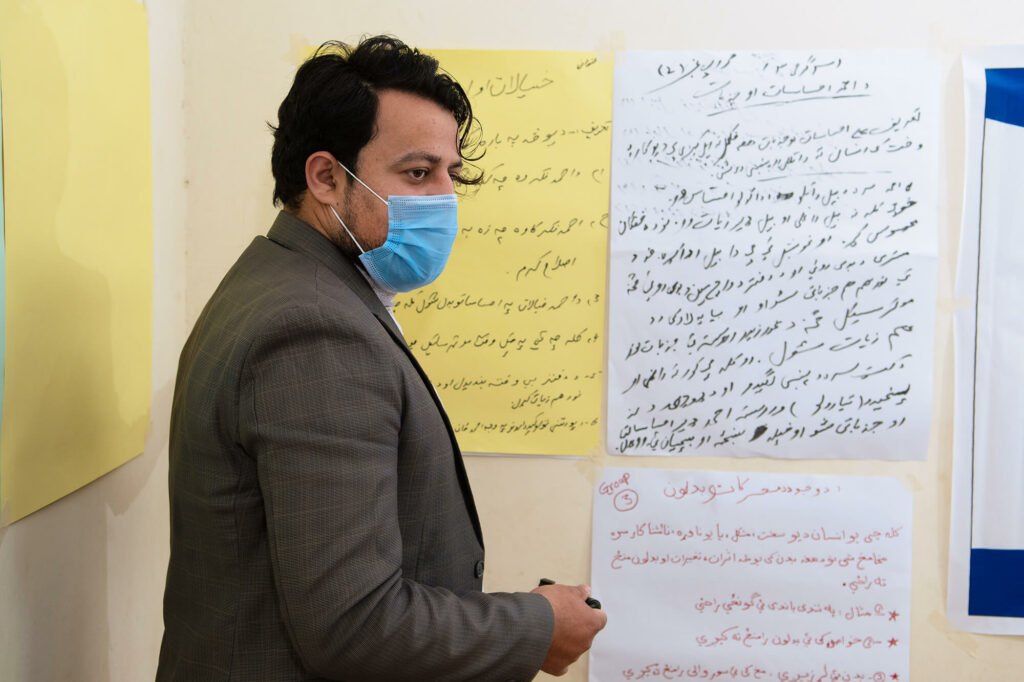Abdullah, a 23-year-old Afghan refugee, is standing in front of a group of men and women, leading them through a presentation. The topic? The rights of men and women in his village in Khyber Pakhtunkhwa province.
Abdullah is an advocate for women’s rights and for combatting gender-based violence (GBV). However, like many in his village, Abdullah didn’t always believe that men and women could have equal roles. He believed that their responsibilities were separate—women did household chores while men were the heads of the family, making decisions and earning money.
This belief extended even further. Men and women didn’t just have separate responsibilities, he thought; women did not even have agency over their actions. Instead, they were tied to their husband’s decisions, lacking authority and support.

“I used to believe that women could not do anything without the consent of a man,” he says.
The disparity between the rights of men and women was an urgent issue in Abdullah’s village. Women are vulnerable when social and moral structures break down due to conflict, and as people seek control over their circumstances, the likelihood of GBV increases.
Over time, it became clear that action was needed. That was when International Medical Corps’ team in Pakistan stepped in to help.
With support from Pakistan’s Bureau of Population, Refugees and Migration (PRM), International Medical Corps has implemented the Engaging Men through Accountable Practices (EMAP) program in several refugee communities in Pakistan, including Abdullah’s.
The EMAP program faced a challenge—previous efforts around GBV had failed to create lasting change and only reinforced cultural expectations. Women were still expected to seek men’s permission to learn new skills. Gender norms remained, and women were still at risk. To succeed, International Medical Corps had to address the root of the problem: power dynamics between men and women.
The EMAP program works by uniting men and women through conversation. Over the course of 16 sessions, participants discuss gender, sexuality and power. Together, participants make crucial steps toward valuing women equally and combatting GBV. As men explore how they have been socialized and examine the gendered impact of conflict, they realize how they can change their behavior.
“Just as women face risks in their community for coming out of the kitchen, men face criticism if they respect women’s choices,” he explains. “The community and the other men do not approve of being considerate to women.”
At the seventh session, as part of an exercise to understand power dynamics in the home, Abdullah listed the daily activities of women and men. He realized the burdens that a woman carries every day—burdens that Abdullah now addresses in his own home with his wife.
“I listen to and ask for the opinions of the women in my house. They still hesitate, but I am hopeful that I will make them comfortable enough to express themselves freely in front of me, and we will eventually make decisions together,” he says with a smile.
The journey hasn’t been easy. Abdullah also recognized the different risks that men and women face when confronting gender roles.
These risks haven’t held Abdullah back from challenging his beliefs on gender norms. He continues to listen, reflect and work toward establishing equality within his community.
“I truly feel fortunate for getting the opportunity to realize my behavior and attitude toward women in my family, especially with my wife,” he says. “Honestly, in the beginning, I was not sure that I would be able to change my perspective. But gradually, I started to reflect on how gender and power affect our lives.”
